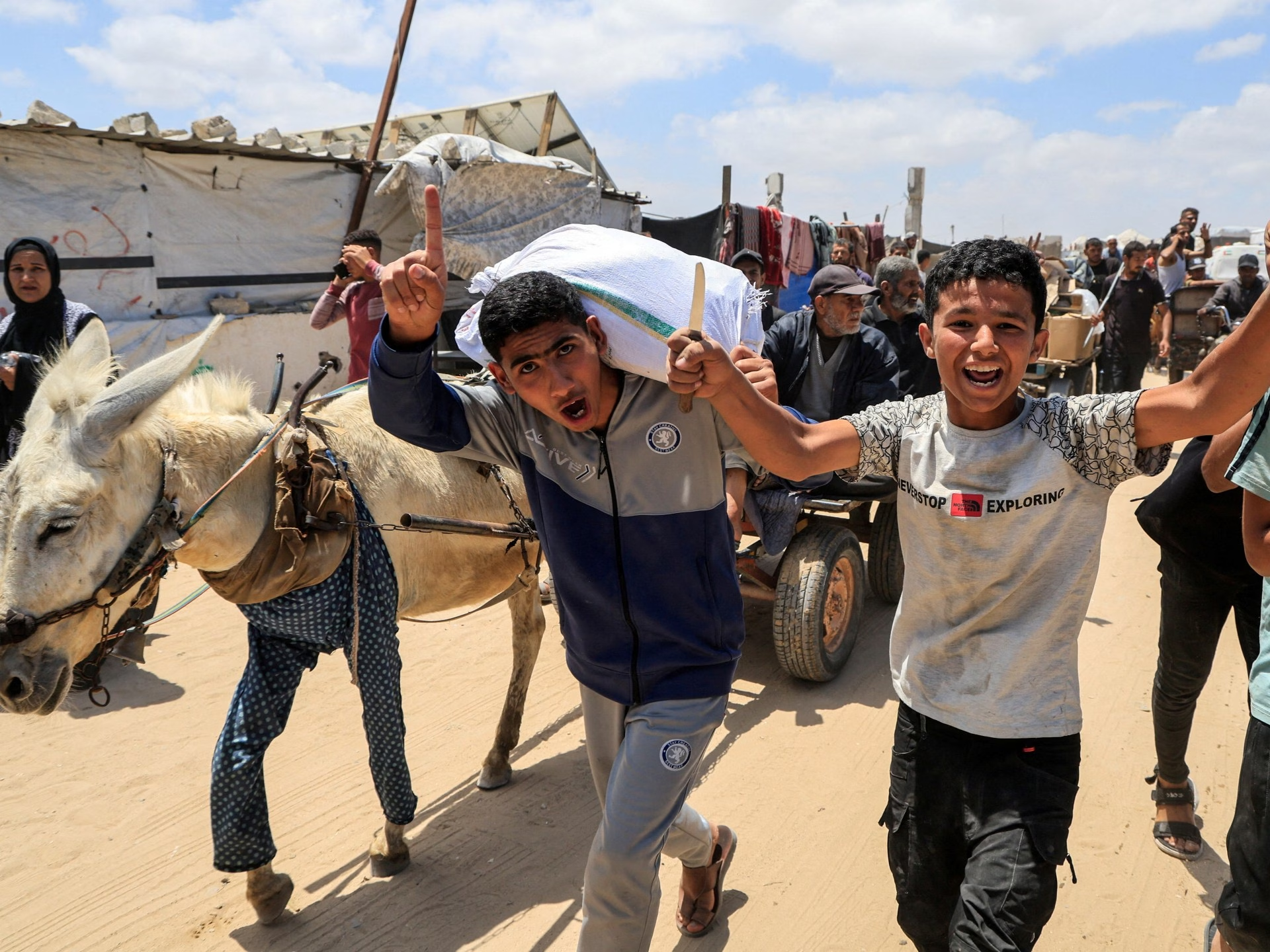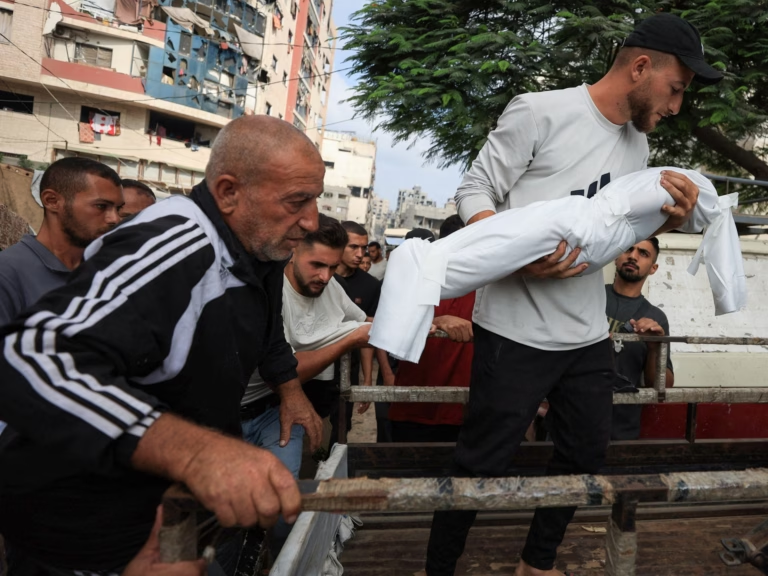Wednesday’s destination for Jehad was an aid distribution hub in Rafah, situated in the southern extremity of Gaza, managed by the United States-backed Gaza Humanitarian Foundation (GHF).
Fueled mainly by the responsibility for his pregnant wife and two famished daughters, Jehad undertook a laborious 10km (6.2 miles) journey to reach the site.
Starvation was rampant throughout Gaza, a direct consequence of Israel’s prolonged blockade on the region, making the GHF site Jehad’s only beacon of hope.
This was despite the controversy swirling around the organization whose chief had stepped down on Sunday, citing the GHF’s inability to adhere to “the humanitarian principles of humanity, neutrality, impartiality, and independence”.
The GHF’s inexperience in managing aid distribution was underscored on Tuesday when at least three Palestinians died in the tumult surrounding the relief effort.
Yet in Gaza, individuals are not only starving but also desperate; Jehad is among them.
After a grueling 90-minute walk, the 31-year-old found himself at the iron gates of the distribution center alongside thousands of others, just as they abruptly opened.
“Crowds charged in – thousands of people with no semblance of order. They rushed toward the yard where aid boxes were stocked and then into the inner hall, brimming with more supplies,” Jehad recounted to Al Jazeera.
“It was chaos – a true struggle. Men, women, children, packed together, jostling to grab whatever they could. No queues, no system – just hunger and disorder,” he added.
Inside the hall, people seized whatever they could carry. “Anyone who could hoist two boxes took them. Sugar and cooking oil were the top priorities. They snatched what they wanted and fled,” he said.
“There was no hint of humanity in what transpired. I was nearly crushed by the throng,” he stated.
A mere stone’s throw away, armed foreign forces stood idle, failing to intervene. Jehad confronted one, voicing his discontent.
“I told them, ‘You’re not assisting – you’re overseeing a famine. You should depart. Your presence here is superfluous,'” he recalled.
Jehad managed to secure merely a handful of items: cans of tuna, a modest bag of sugar, some pasta, and a scattered packet of biscuits. He hoisted them in a plastic bag draped over his shoulder and embarked on the protracted journey back home.
“I could only secure a little. Staying any longer risked being trampled in the stampede – but I needed to bring something back. My girls must eat. I have no choice,” he affirmed.
Upon his return to the tent, his daughters welcomed him joyously – even for the meager provisions he brought.
“My wife and I ration the food we bring back to last several days for the kids. We often skip meals. The children cannot endure this… and I bear the entire responsibility of feeding them,” he remarked.
Apocalyptic
Awad Abu Khalil, also among the desperate crowds on Wednesday, likened the scene to “apocalyptic” chaos.
“Everyone was sprinting. It was pandemonium. The aid was piled up and everyone was just attacking it, snatching whatever they could,” he described.
Awad shared hearing gunfire in the distance, likely aimed at young men attempting to bypass the designated paths.
He expressed deep disappointment with the personnel. “I hoped the American staff would distribute the aid at stations, giving each person their share – not this disorder,” he lamented.
Tuesday and Wednesday’s images intensified the international criticism aimed at the GHF, with representatives from several countries condemning Israel’s decision to bar the United Nations and international humanitarian organizations from delivering aid to Gaza.
Israel halted aid entry into Gaza in early March, when a ceasefire was still in effect. It has since unilaterally broken the ceasefire, intensifying its campaign on Gaza, with the official death count surpassing 54,000 Palestinians.
“We previously received aid from international agencies and the UN. It was distributed by name, systematically – no chaos, no humiliation,” Jehad said.
By the end of Wednesday, Gaza’s Government Media Office reported at least 10 Palestinians seeking aid had been killed by Israeli forces in the preceding 48 hours.
Humiliation
Awad and Jehad were amongst the fortunate few who returned home with some provisions.
Jehad said his wife and mother prepared bread from the pasta, using it to make a simple pudding with the sugar for the children. He intended to return the following day, he stated.
Even these attempts at securing food bear comparison to the plight faced by many in Gaza.
Walaa Abu Sa’da, with three children including a mere 10-month-old, could not bear the sight of others returning with food while her own starved, so she ventured to Rafah alone.
“I confronted my husband, who refused to go due to fear of the [Israeli] army. I swore I would go myself,” Walaa informed Al Jazeera.
Entrusting her children to her sister, she merged with the crowd heading toward the distribution site.
“My children were on the brink of starvation. No milk, no food, not even baby formula. They cried day and night, and I was compelled to beg neighbors for scraps,” she said. “So I went, disregarding my husband’s concerns.”
However, by the time Walaa arrived at Rafah, it was too late.
“People were fighting over the remnants. Some carried torn parcels,” she recounted.
Walaa left the distribution site empty-handed. On her return journey, she witnessed a man drop a bag of flour from his torn parcel.
“I picked it up and asked if I could have it,” she said. “He shouted, ‘I traveled all the way from Beit Lahiya in the far north of Gaza to acquire this. I have nine starving children. I’m sorry, sister, I can’t give it away,’ and he walked off.”
“I understood, but his words devastated me. I wept for what we’ve become,” she added.
Walaa described the ordeal as deeply humiliating, filled with shame and a sense of inferiority.
“I concealed my face with my scarf the entire time. I didn’t want anyone to recognize me picking up a food parcel,” Walaa, a geography teacher with a bachelor’s degree, said.
Despite her sorrow, Walaa affirmed that she would repeat the endeavor if necessary.
“There’s no dignity left when your children are weeping from hunger. We won’t forgive those responsible for bringing us to this point.”








